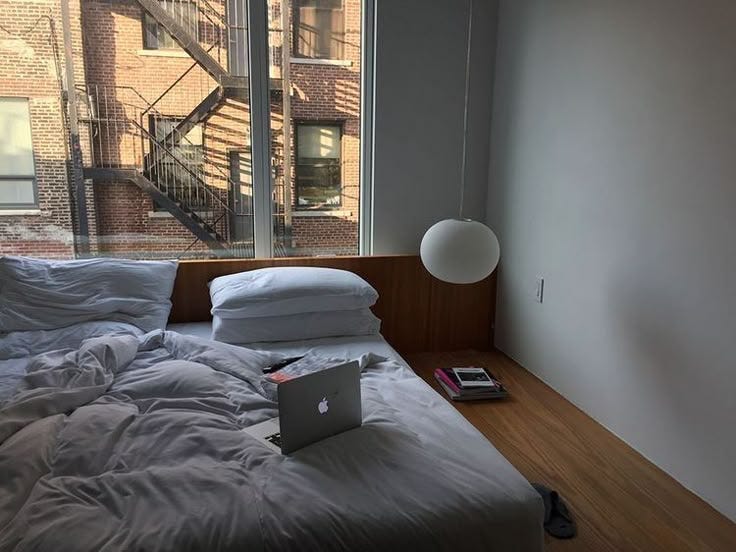How to feel like a human again
Reintegrating into life and work in an intentional way (after being sick)
Last week I spent 5/7 days bedridden from food poisoning. I used to feel so much anxiety after being sick. Knowing that I’ll have so much work to catch up on and expectations with clients to manage, the days that are meant to be recovery days always feel like a rush to get back on track.
‘Balance’ is one of my main intentions for the year, so this time around rather than seeing my sick days as a setback, I’m choosing to see it as a reset instead.
Mentally, coming back to work has felt like a perspective change. Knowing that I have deadlines to meet, it’s forced me to evaluate what tasks and projects I need to prioritize. In the process, I’ve also started to think about whether my current projects align with my goals. Am I taking on the right clients? Working with the right brands? This clarity has also felt like a refreshing change to how I work and what I choose to dedicate time to.
If you’ve ever felt that post-sickness (or even post-travel!) anxiety, here’s my personal game plan for reintegrating into life and work in an intentional way.
(Note to self: never have oysters in Vancouver again. I eat oysters whenever I travel to a oceanside destination but for some reason both times I’ve gotten a bug or food poisoning from oysters was in my home city. If that’s not confirmation it’s time for me to move, I don’t know what is.)
Review
Instead of diving back into the same routine you had before, spend those first few days (or hours) taking stock of everything you have going on. For me this looked like doing a massive brain dump in my journal. I love a good list but lately I’ve been loving mind maps even more.
This could feel a little daunting at first, especially once you’ve completed your brain dump and you’re just sitting there looking at the massive list. But I want to challenge you to think of this as emptying your brain.
Managing anything in life is so much harder when you don’t have a system in place to help you execute. By making the brain dump as your first step, you’re actually clearing space by getting everything you need to get done down on paper. Now we have the mental capacity to start planning.
Journaling prompts for reviewing
What projects am I currently working on that excite me the most? Why?
Which tasks or commitments feeling the most draining? The least exciting?
What are my top 3 priorities for this week?
What habits have I developed that are no longer serving my goals?
What projects are no longer serving my goals?
Where am I saying “yes” when I should be saying “no”?
Reset
When it comes to reseting, I see it happening in two phases.
Phase 1 - Physical
Phase 1 is our physical reset. Nothing makes me feel like a human again more than a reset of my home. My bedroom becomes a pig sty when I’m sick—sheets are a mess, various vitamin and medicine bottles carelessly tossed aside, and of course 52 cups of half-full waters covering every other surface. So taking the time to take care of the mess (and also sanitize everything) is always a good start.
I also love a good ‘everything shower’. We’re dry-brushing, scrubbing, shaving, washing, conditioning, double rinsing, and moisturizing—the whole nine yards. I swear everything showers make me feel like a phoenix reborn, especially after I’m sick.
Phase 2 - Planning
Phase 2 of our reset happens in our planner, Notion, and calendars. We’re essentially going to review everything that we had planned from before we were sick to see if there’s anything we could move around, cancel, or postpone. Maybe you cross some things off your brain dump list and get it into your calendar. Or maybe you just clear your calendar altogether and start over. Either way, take your energy levels into account and be gentle with yourself. Give yourself the grace you deserve to start slowly.
When I was still working a 9-5, one of my mentors told me to “practice the 50% rule” after I had the flu. Whatever you think you can handle, cut it in half for the first day or two. Being ambitious is great but not if it compromises your health. Even if you can handle all the tasks you set out for yourself, you really don’t need to be doing all of them at once.
Journaling prompts for resetting
What do I need most right now to feel physically restored?
How can I make my environment more conducive to recovery and focus?
What commitments can I postpone without causing major disruptions?
What boundaries do I need to set as I transition back to work?
How can I better honor my energy levels moving forward?
What support systems can I lean on during this transition period?
Restart
Once you've taken time to reset and ease back in, you can begin thinking about how to move forward with intention. One of the best habits I implemented last year was picking 3 priorities to focus on each day. These priorities are always picked with the Pareto principle in mind—what’s the 20% of work that would provide 80% of the results?
Applying this to your first few days back at work—what are the 20% tasks that require your attention the most right now? Go back to your brain dump and highlight the ones that are time sensitive for this week.
Pomodoro
If you don’t typically use the pomodoro technique, now’s the perfect time to start. Schedule in 30-45 minute work blocks with a 5-10 minute break in between. Listen to your body and tune into your energy levels. If you feel your brain wandering, your energy levels depleting, and your body feeling week—take a break. You’re not going to produce great work when you’re forcing yourself to overstep your limits.
Power hour
I’m definitely someone who front-loads her day, putting the more intensive work at the start of my day when I have the most energy. This works for me and my circadian rhythm as I’m a morning person with the most energy at the start of my day.
I love scheduling a power hour in my mornings—a 1 hour block for quick wins and small tasks to build momentum. Depending on your energy levels and chronotype, your power hour might work better in the afternoon or evening. The key is to identify when you naturally have the most focus and energy, then schedule your most important tasks during that time. This way, you're working with your body's natural rhythm rather than against it.
Create a “not now” list
If there are things in your brain dump or things that come to mind when you’re working that you should do but aren’t super time-sensitive, write them down in a “not now” list. Use this list to keep track of non-urgent requests or ideas that come up so that when you’re back at 100% and have more energized free-time, you can tackle them then.
Journaling prompts for restarting
What are my top 3 priorities for tomorrow?
How can I structure my day to protect my energy levels?
What would make me feel accomplished by the end of this week?
Which tasks align best with my current capacity and goals?
What systems can I put in place to prevent overwhelm?
How can I celebrate small wins during this transition period?
Coming back to life and work after being sick doesn’t have to feel like a race to catch up. Get intentional with how you review, reset, and restart. Turn what feels like a setback into an opportunity for a perspective change. The goal should never be to bounce back as quickly as possible but to come back stronger and more aligned with your goals and values. See this as a chance to build a stronger foundation for your ambitions and dreams. Be gentle with yourself and trust that you’ll find your rhythm again in a way that feels sustainable and energizing.








Great perspective, needed to hear this.
I love the prompts & questions! I have recovered from horrendous food poisoning two weeks ago and I feel like it took me another 2 days to feel like myself again. Glad you're feeling better 💘